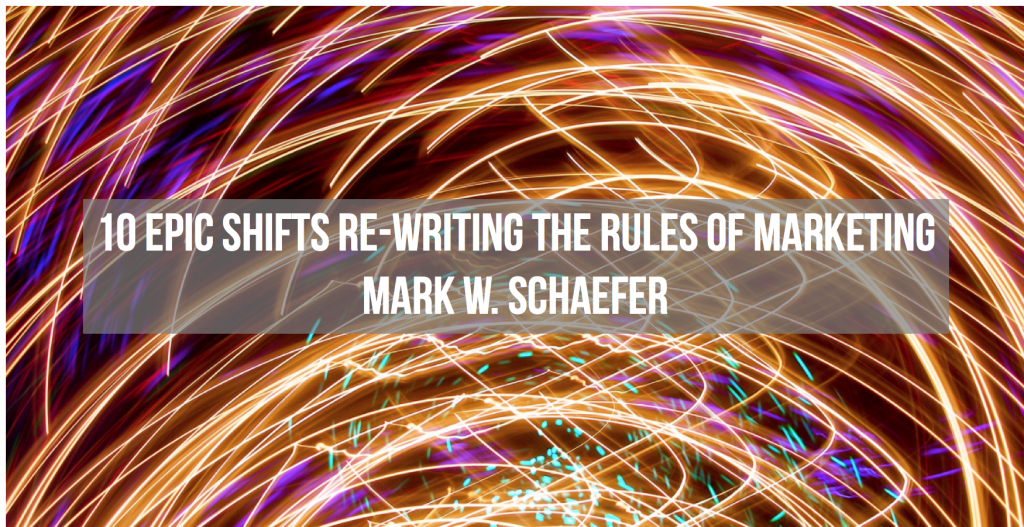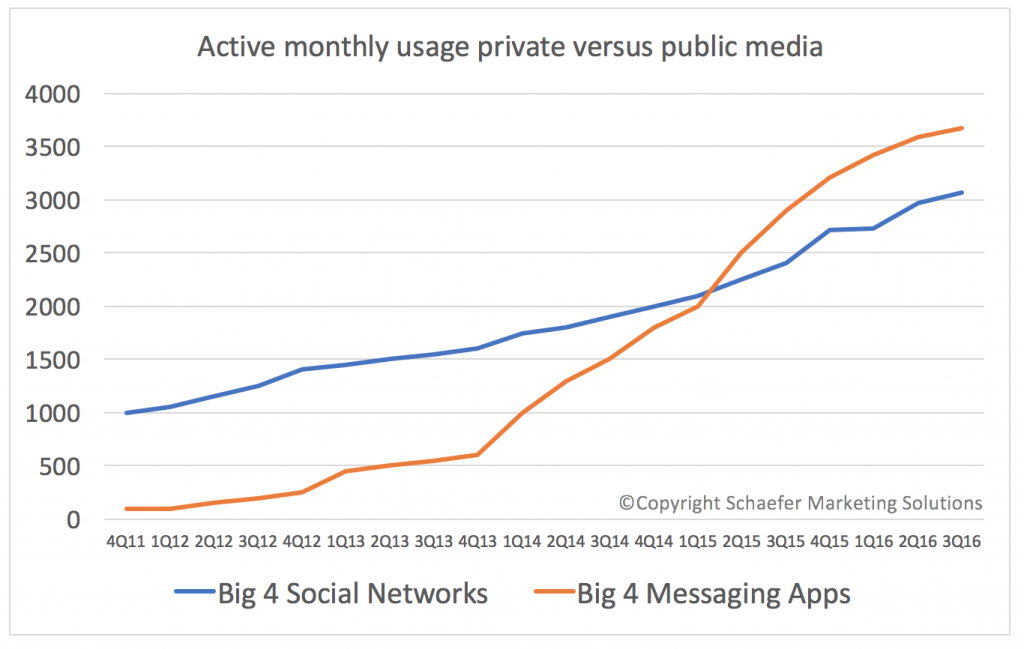
By Mark Schaefer
I’m often asked: “What is the next big thing in marketing?”
This seems like a simple question, but I’m not sure I know any more. I started thinking about this and came up with at least 10 “big things” that will profoundly impact my career, and yours. I first posted this list on Facebook and it provoked some interesting comments. Here’s my take on the next big thing(s), with comments from some marketing friends.
1) The Spawn of Artificial Intelligence
What I mean by “spawn” is that AI is simply the mother technology for so many new innovations. In fact futurist Kevin Kelly stated in his wonderful book The Inevitable that nearly all innovation going forward means adding artificial intelligence to existing products. He thinks it will get to the point where we will be able to plug-in super intelligence to almost any software, service, or daily task.
There are SO many implications of adding computer intelligence to what we do, including the rise of chat bots, business intelligence, image recognition, marketing automation, and algorithmic writing, to name a few!
You may find it strange that I don’t include “Big Data” in this list of 10 trends. I see AI as the interface, the translator that makes Big Data accessible and real for marketers. Big Data won’t be a “thing” very soon. It will simply be the fuel for AI.
2) Virtual reality
While Artificial Intelligence toils silently in the background of our lives, I believe VR is THE game-changer for almost everything we do in marketing. Within three years many people will be wearing some sort of AR headset many hours each day for both work and play. It will replace much of the functionality of smartphones, computers, and televisions … basically any screen we use today.
AI will be the new way we connect, discover, learn, and entertain ourselves. I think the adoption of this technology will be meteoric because it is addictive. But that’s a story for another blog post!
VR will have a more profound impact on the world than the internet. The web will surround us like the air that we breathe.
Instead of fighting over keywords in a never-ending SEO/ad war, the new battleground will be creating the most fun and immersive experiences for our customers. This is our opportunity to invite people out of their filter bubbles and tempt them to spend some time with us and our very intoxicating VR thrill ride. I can see it now: “The Pampers Diaper Experience.” Ha!
3) Wearable tech
Wearable tech turns each of us into mobile data-generating machines. We’re streaming information about our life, bodies, consumption habits, friends, families, travels, relationships and more that will greatly please the Internet overlords.
Of course there is a tremendous upside as well as that stream of data produces goods and services that serve us precisely based on our DNA, our moods, our whims, and the personal needs, wants, and desires that companies will know better than our we know ourselves.
Douglas Karr, founder of the MarTech blog, said this data flow could mean “the death of mass media and rise of targeted, personalized marketing experiences through ABM and similar tools. We’ll see experience-based KPIs and experience analytics beyond simple sentiment and customer satisfaction.”
Marie-Clare Byard adds: “You won’t be going to the doctor’s anymore, you’ll be taking ECG’s with your mobile phone and your mirror will scan you every morning checking out all your vitals. Combined with wearables, technology is predicting illness quicker then humans.”
4) Media revolution
To look at the future of content marketing, we need to observe the bleeding edge of content disruption occurring with traditional media. We’re witnessing a decline in traditional news-gathering and reporting, desperate monetization struggles, a loss of control of the content as it is absorbed by social platforms, a loss of direct relationships to subscribers, and intense innovation in new content forms like interactive graphics/video.
The fragmentation of content channels that occurred with the internet (everyone is a publisher!) is less important now as powerful media gatekeepers re-assemble in the form of Facebook (they determine what we see), Google (they determine what we find), and Amazon/Apple (they determine how it is distributed). Most internet revenue is now generated from subscription models (over advertising) but ironically, most of the actual content creators aren’t benefitting from the gold rush.
5) Distribution revolution
The advent of drones and 3D printing will revolutionize marketing by creating entirely new business models. The goal of marketing is value creation and customer acquisition and perhaps there is no greater impact on this than the revolution in how we deliver products to customers.
Laura Kessler believes this might be the most important trend in business today: “Through new distribution frameworks we will achieve high-speed drone delivery, duplication and replication engineering, that will change everything in business and society well beyond marketing.”
6) Dramatic changes in Martech
I was recently at a conference populated by dozens of marketing technology companies. I became frustrated that none of them seemed to be able to tell me how they were different from anybody else. Any point of differentiation seemed like a wafer-thin veneer of sales babble.
I think there will be a big change in this field in the next few years. There has to be a shakeout/consolidation that will probably be driven by integration with artificial intelligence. We will see exciting new functionality and the automation of many traditional marketing functions which will lead to …
7) Job loss
I don’t want to be your daily downer but I just don’t see how this technology revolution is going to result in a net increase of marketing jobs. Many economists predict massive knowledge worker job loss … and marketers are knowledge workers. Yes, there will be new job categories. But the economists have accounted for that and the future may be turbulent for we, the marketeers.
I think a lot of people are in denial about this, claiming that “we will always need humans to make the decisions.” No. We don’t. Most companies want to eliminate human error by removing human decision-making. This is happening, folks.
This point may receive push-back from my readers, but when I see the amazing stuff coming out of the field of cognitive computing, my reaction is “Dammit. That computer is doing what I do!” It isn’t going to happen overnight but the adoption of these new AI-driven technologies will probably be rapid, at least at large, progressive companies.
Jonathan Payne adds: “We’re about to see such an extreme tech and economic shift that I think is going to catch a lot of people off guard — people assume automation is only a threat to unskilled manufacturing jobs. And more significantly, this is going to require a fundamental psychological shift in our culture that I’m not too convinced most of us are ready to make.”
These job losses, especially at the middle levels, will throw our field into turmoil. What does this mean for careers, skills, and the imperative for personal branding/personal relevance?
8) The new branding imperative
Content is becoming commoditized and this will accelerate once algorithms start writing the blog posts and creating the infographics (which is already happening). We are deep into the first stages of Content Shock and the high level of content competition is weeding out the weakest links. Some companies simply won’t be able to keep up.
In my book The Content Code, I articulated the six possible strategies that can overcome Content Shock and at the top of the list is branding. Creating an emotional connection with customers that encourages them to seek us out amid all that noise is more important than ever.
9) Influence marketing
I just returned from a conference where I facilitated round table discussions among some of the nation’s top CMOs. It seemed that no matter the topic, the discussion always turned back to influence marketing. We are moving inexorably toward an ad-free world. In that environment, what are we going to have left other than aligning ourselves with the advocacy of trusted internet stars?
This is a topic worth exploring in an entirely separate post (and I will) but I think that a well-executed influence marketing strategy may be a true source of competitive advantage. There are only so many influencers to go around.
Jeremy Bednarski said, “Those who want to take advantage of influence marketing need to do so quickly. There are only so many influencers and only so much content they will be able to endorse. Think of it as content shock specifically for influencers.”
10) The rise of the private networks

About a year ago I wrote a post about a milestone. For the first time in history the number of people active on private networks (like Messenger, WhatsApp and Snapchat) exceeded those using public social media platforms (like Facebook, Twitter and LinkedIn). Social media use is still growing too, but the rise of these private networks represents a profound shift for marketers.
Why is this shift occurring? People are tired of social media scrutiny and bullying. They are concerned about their permanent social footprint. Why not take it behind a firewall and contain your messages to trusted friends? That private environment nurtures more trust, vulnerability and authenticity … perhaps that is what social media was supposed to be in the first place.
The bad news is, all that amazing data we could see on Twitter and Facebook is going dark. The good news is (maybe), Facebook owns Messenger and WhatsApp — will marketers have access to this goldmine of anonymized data some day? Our immediate challenge — how does a company add value in that private environment without being creepy?
So that is a bit of my current thinking. What’s your take on these trends?
 Mark Schaefer is the chief blogger for this site, executive director of Schaefer Marketing Solutions, and the author of several best-selling digital marketing books. He is an acclaimed keynote speaker, college educator, and business consultant. The Marketing Companion podcast is among the top business podcasts in the world. Contact Mark to have him speak to your company event or conference soon.
Mark Schaefer is the chief blogger for this site, executive director of Schaefer Marketing Solutions, and the author of several best-selling digital marketing books. He is an acclaimed keynote speaker, college educator, and business consultant. The Marketing Companion podcast is among the top business podcasts in the world. Contact Mark to have him speak to your company event or conference soon.
Book links are affiliate links.
Illustration courtesy Flickr CC and Thomas Quine
The post 10 Epic Shifts that are Re-Writing the Rules of Marketing appeared first on Schaefer Marketing Solutions: We Help Businesses {grow}.
from {grow} http://feeds.feedblitz.com/~/272993830/0/markgrow~Epic-Shifts-that-are-ReWriting-the-Rules-of-Marketing/
No comments:
Post a Comment